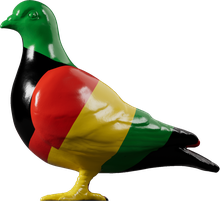Printed Ephemera — 1864
The Irish Street-Seller. "Sweet Chany. Two a pinny Or-r-ranges-two a pinny!"
This engraving was published in Henry Mayhew's study of 'London Labour and the London Poor: The condition of those that will work, cannot work, and will not work', first published in 1851, with an additional volume in 1861. This illustration has the date 1864 which refers to a revised reprint of the publication in 1865. Mayhew commissioned the photographer Richard Beard to make daguerreotype portraits of some of the 'street folk' he interviewed. These were copied to make engravings to accompany the text of the publication.
Mayhew found the street seller of oranges depicted in the illustration near Cold-bath fields prison. He noted the trade was almost entirely in 'the hands of the Irish'. The woman, described by Mayhew as 'neither squalid in appearance nor ragged in dress, though looking pinched and wretched told Mayhew she had come to London from Ireland as a 'girl' but her Catholic parents had died a few years after their arrival. Married to a hard working labourer with children aged 2 and 4 she was working temporarily as an orange seller as her husband was currently unable to find work. On calling on the woman the following day Mayhew found her and her children absent. According to neighbours her husband had now found work at some distance away and the family had gone to find cheaper lodgings closer to his work. Mayhew's observations of the orange trade concluded English costermongers did not like the Irish and did not hesitate to cheat them, and oranges were easy to cheat with. As an English coster who sold wholesale to Irish women noted if oranges are boiled they swell and look finer and that any unfortunate Irish seller being tricked into buying them 'would be astonished to find her stock of oranges turn dark-coloured and worthless in forty-eight hours'.
- Category:
- Printed Ephemera
- Object ID:
- 2001.69/115
- Object name:
- The Irish Street-Seller. "Sweet Chany. Two a pinny Or-r-ranges-two a pinny!"
- Object type:
- Artist/Maker:
- Hine, Henry George
- Related people:
- Related events:
- Related places:
- Production date:
- 1864
- Material:
paper, ink
- Measurements/duration:
- H 213 mm, W 133 mm (overall)
- Part of:
- —
- On display:
- —
- Record quality:
- 100%
- Part of this object:
- —
- Owner Status & Credit:
Permanent collection
- Copyright holder:
digital image © London Museum
- Image credit:
- —
- Creative commons usage:
- —
- License this image:
To license this image for commercial use, please contact the London Museum Picture Library.

